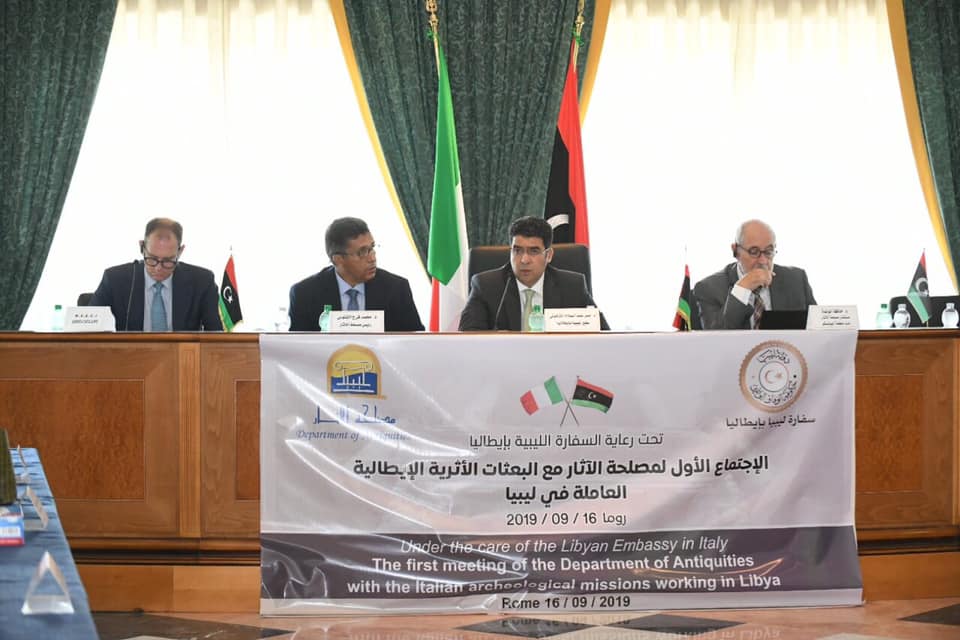By Sami Zaptia.
London, 18 September 2019:
Mitiga airport has continued to be targeted reportedly by pro Khalifa Hafter forces, despite being closed since 1 September.
There were reports of the closed airport being struck for the fourth successive time yesterday. The strikes are widely attributed in Tripoli to forces loyal to Khalifa Hafter and his Libyan National Army (LNA).
The airport was also struck last Saturday while the pro Tripoli forces reportedly struck Hafter at Juffra air base on the same day, which they say is now his main operations room after he was forced out of Gharian. Hafter’s forces were also reported to have struck locations in Sirte on Monday.
There are mixed views as to why the closed Mitiga airport continues to be struck. One theory is that the strikes are aimed at drones still using the airport.
Another is that it is being struck in retaliation for losses by the LNA in other battles on the ground and to terrify Tripoli’s residents.
It will be recalled that the airport was shut down with all civilian flights transferred to Misrata airport, two and a half hours drive east of Tripoli.
The shut down came as a result of a strike on the Airport late on 31 August / early 1 September which reportedly narrowly missed a plane landing with passengers returning from pilgrimage in Mecca.
The Hafter side has consistently claimed that Mitiga’s civilian airport was being used for military purposes by forces defending Tripoli.
Both the pro Hafter forces, which had on 4 April this year launched an attack to “liberate” Tripoli from “Islamists, terrorists and militias”, and the forces defending the city and aligned to the internationally recognized Libyan government led by Faiez Serraj, have continued to exchange strikes ever since.
Some strikes are reported as airstrikes whilst others as missiles or shells. Most of the airstrikes are reported by both sides as being carried out by “foreign” or “foreign operated” drones.
The forces defending Tripoli claim that attacks in support of Hafter’s forces are being conducted by UAE or Egyptian personnel.
https://www.libyaherald.com/2019/09/09/libyas-internationally-recognized-government-condemns-uae-support-for-hafter/
The pro Hafter forces, on the other hand, claim that pro Tripoli air strikes are being conducted by Turkish personnel.
It will be recalled that in its 12 September decision to renew the UNSMIL mandate in Libya for another year, the UN Security Council called on all foreign states to refrain from supporting the war in Libya. This included adhering to the UNSC arms embargo on Libya.
The relevant text read as follows:
“Calling for full compliance with the arms embargo by all Member States, in line with resolution 2441 (2018) and all of its previous resolutions on the embargo, and further calling on all Member States not to intervene in the conflict or take measures that exacerbate the conflict”
https://www.libyaherald.com/2019/09/16/serraj-government-welcomes-unsc-extension-of-unsmil-mandate-for-another-year/
With regards to fighting on the ground, where it has been very difficult to establish a clear picture of the fighting, both sides continue to make conflicting claims and counter claims.
The big picture, however, is that the forces defending Tripoli have clearly succeeded so far in repelling the Hafter attempt to enter Tripoli with the ground fighting taking part increasingly further away from the centre of Tripoli.
This successful defence comes inspite of repeated claims and threats since 4 April by Hafter’s forces that they will be “liberating” Tripoli soon. However, five months on, Hafter’s efforts in fighting on the ground have achieved no progressive results.
Indeed, UNSMIL head Ghassan Salame went so far as to suggest in his 4 September report to the UN Security Council that there is a stalemate in fighting on the ground with both sides suffering from “combat fatigue”.
This alleged ground stalemate – although the Tripoli forces are of the view, with good argument, that Hafter since his 26 June defeat in Gharian is on the defensive and retreat – may be an explanation for the increased air strikes.
The Tripoli forces say Hafter has had to resort to pointless and increased airstrikes in desperation and as a cover up and distraction away from his losses on the ground.
All eyes are now turned to the German proposed international conference on Libya in the latest of attempts to solve Libya’s crisis through political dialogue.
https://www.libyaherald.com/2019/06/26/hafter-forces-suffer-setback-as-they-lose-gharian/
https://www.libyaherald.com/2019/08/30/serraj-government-says-gharian-still-under-its-full-control-despite-two-failed-lna-attempts/
https://www.libyaherald.com/2019/09/05/salame-to-unsc-fighter-deaths-in-thousands-arms-embargo-is-ineffective-both-sides-ready-for-peace-due-to-battle-fatigue-and-external-state-interference-main-driver-of-libya-conflict/






